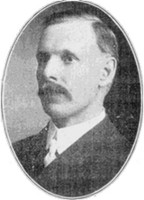|
JUDGE JAMES D. ELLIOTT

 Born at Mt. Sterling, Illinois, October 7, 1859, of Scotch parentage, James D. ELLIOTT was, nevertheless, while yet a mere babe, taken
by his parents to Ringgold county, Iowa, where he spent his early childhood. His father served two enlistments in the
Civil War. Although but a mere child at the time, Judge ELLIOTT remembers seeing his father bid the family farewell, mount
his horse and ride away to the service of his country. He also remembers the assassination of President LINCOLN. After the
war, the family removed to Guthrie county, Iowa. Here young ELLIOTT attended a district school and later took up work in
an academy. He would have graduated from the latter institution in June, 1872, had not his parents, in April of that
year, moved to Clay county, South Dakota.
Born at Mt. Sterling, Illinois, October 7, 1859, of Scotch parentage, James D. ELLIOTT was, nevertheless, while yet a mere babe, taken
by his parents to Ringgold county, Iowa, where he spent his early childhood. His father served two enlistments in the
Civil War. Although but a mere child at the time, Judge ELLIOTT remembers seeing his father bid the family farewell, mount
his horse and ride away to the service of his country. He also remembers the assassination of President LINCOLN. After the
war, the family removed to Guthrie county, Iowa. Here young ELLIOTT attended a district school and later took up work in
an academy. He would have graduated from the latter institution in June, 1872, had not his parents, in April of that
year, moved to Clay county, South Dakota.
This brought a new chapter into his life. Here was a boy who had entered school at four years of age and who had
practically completed an academic course at thirteen. Once in Dakota, conditions changed. He lingered along at the old
home on the Missouri bottom, for several years, getting such help in his studies as he could from intelligent settlers
here and there. Finally, when the Vermillion city schools were organized he went there and took a four-year course in two
years; that is, he took the two-year high school course which was established and a special two-year course beyond it, in
half time. Yet this achievement was not accomplished without one of the most severe struggles in the history of a man. His
parents were exceedingly poor. James hadn't a dollar. He slept in the rear of a vacated building, with no fire. Night
after night he shivered himself to sleep. For food he hadn't a bite except that sent to him now and then in a rough
wooden box by his loyal mother. He piled sticks in the alley, set them on fire, thawed out his food, ate it and underwent
hardships that would make even Dr. COOK blush in his quest for the north pole. The second year was easier, — he got
janitor work to do to pay for his board.
STUDIED LAW
Upon the completion of his school work at Vermillion, he taught school — one year in Clay county, one in Yankton county,
and one term in Nebraska. During this time, he saved his money and invested it in cattle which he turned into his father's
herd, and which he hoped to sell later to raise money with which to put himself through the law school at Ann Arbor,
Michigan. But the great flood of 1881 swept away his father's property, drowned all their cattle and destroyed everything
they had, leaving the family penniless, and young ELLIOTT to lay the foundation for his destiny all over again.
Accordingly the next year he entered the law offices of GAMBLE brothers — John R. and Robert J. — at Yankton and began to
read law for himself, while for a livelihood he slept in the office and kept books at night, dividing his surplus earnings
with his parents and five sisters. In this connection it may be well to state that no boy ever had a better opportunity to
read law, for, without casting any reflection upon any other man, it is safe to state that John R. GAMBLE, who at one time
was our congressman, was the brainiest and most brilliant attorney that has ever graced either of the Dakotas. It was a
rare privilege for a young man of ELLIOTT's temperament to have known him and to have studied under him. So thorough and
so broad was his instruction and that of his brother Robert's to their devoted law student that today their young protege
occupies the leading bench of the state, with no other legal preparation, save that secured under their tutelage.
AN HONEST ATTORNEY
Young Elliott was admitted to the bar in 1884, and he at once settled at Tyndall, where for twenty-seven years, he was on
one side or the other of practically every case that was tried in court, or else associated with the lawyer who did try
it. His learning was so broad, his conception of duty so high, that more than a hundred times during his Tyndall
practice, aggrieved parties came into his office together, constituted him judge and jury, stated their grievances, took
his verdict, abided by it and went home without going into court at all. This confidence arose from his noble manhood,
from his exemplary life, and from the fact that he was never known to stoop to low scheming in order to win a case.
Forgetful of self, he never urged litigation, but invariably sought to keep his clients out of court.
POLITICS AND IDEALS
In politics he is a complete master of the game. During those long years at Tyndall, he handled the politics of Bon Homme
county in a masterly way, yet nobody fought his leadership; in fact they all sought it. He was made chairman of the
republican state central committee in 1896. A number of his friends begged him to run for governor or for congress, and on
one occasion the leaders of the state legislature urged him to leave Pierre and return to Tyndall, so that they might on
the morrow elect him to the United States senate. But James ELLIOTT emphatically refused. Unlike most politicians who
always have "an axe to grind," Judge ELLIOTT was in politics only for the good he might do his party and his personal
friends. He never sought preferment for himself; rather, he incessantly refused it.
Now, there was a reason for this. When young ELLIOTT was reading law in the GAMBLE brother's offices at Yankton, the only
court in those days was the federal court which convened in Yankton which was the territorial capital. Here the lad saw
federal court conducted, and saw the United States district attorney in action. It appealed to him and it gave birth
within him to some day become our United States district attorney and later on to sit on the bench as federal judge. With
these two ideals before him, he never swerved from his realization of them. The percentage of men who realize their
ambitions in life is so small that it perhaps does not exceed one in every ten thousand. ELLIOTT is one of them.
REALIZED FIRST AMBITION
For the good work which he did in 1896 as chairman of the republican state central committee, in stemming the tide of
populism that was sweeping the state, President McKINLEY, almost immediately after his inauguration in the spring of 1897,
appointed Mr. ELLIOTT United States district attorney for South Dakota. His first ambition was realized. This position he
held for ten years.
Then he became general attorney for the Milwaukee railroad company in the two Dakotas. ELLIOTT named his own salary; the
company accepted it. There was but one stipulation — he refused to do their political work. They exempted him from it.
This new legal department out in the west for a great corporation needed organization; ELLIOTT undertook it. So well did
he succeed that the company raised his salary several thousand dollars before the end of the first year.
REALIZED SECOND AMBITION
But, what about that second ambition—the federal judgeship? Strangely enough, in the winter of 1910-11, a vacancy was
created on the federal bench at Sioux Falls, by reason of Judge CARLAND's promotion to a position on the new Commerce
Court created by special act of Congress. A scramble took place at once among politicians for this federal judgeship. One
dignified lawyer looked calmly on and awaited the verdict, while his friends remained busy in his behalf. And in June,
1911, President TAFT appointed to the vacancy that poverty-stricken lad from the Missouri bottoms, the early teacher in
the Dakotas, the lawyer who had mastered law outside of a law school, the Honorable James D. ELLIOTT — now Judge ELLIOTT,
if you please. At last his cherished ambitions were realized. They had been harbored in his soul for twenty-nine years.
Perseverance wins. In order to accept the honor he took a reduction in salary of $5,000 per year. But he could do this.
Those early days in Dakota had taught him the art of saving. At present he owns sixteen farms in Bon Homme county,
containing six sets of magnificent buildings. His income is sufficient for life without his judge's salary. If it had not
been, he could not have accepted it, for the salary of the position is not commensurate with the financial obligations
which it entails.
NO ENTANGLEMENTS
Immediately upon his appointment, Judge ELLIOTT sold off every dollar of his bank stock and as far as possible liberated
himself from all corporate influences. He also withdrew from polities and has isolated himself from all entangling
matters, so as to make a great judge — one whom the people might love and revere as they did the young Tyndall attorney
in days gone by. Thus far he has already adjudged some of the most important cases in the history of the state, yet not a
single newspaper or individual has found fault with his verdicts. In the one large case from Pierre which was carried to
circuit court of appeals, he was sustained on every point, even though some new law had been written into it.
Said he to a friend not long since: "When I was sworn in as federal judge, I also registered a secret oath with my God
that I would never knowingly misjudge or wrongly sentence any man, and that every person, rich or poor, black or white,
accused of crime, would have to stand before me and have his guilt or innocence weighed in the same scales of justice,
and I shall never break that oath." He never will! Let us all unite in congratulating him on the achievement of his
ambitions, and in hoping that the boys of the rising generation may emulate his noble example!
When he was active in politics,[Judge ELLIOTT] was never known to err in judgment or in prophecy. He was identified with
the old wing of the Republican party until 1906, and until that time they never tasted total defeat. His judgment in
politics was infallible. But when the practices of the old organization became intolerable to him, he promptly left them
and became one of the leaders in the reform movement. Momentarily a new chapter was written in our political history.
SOURCE: COURSEY, O. W. Who's Who in South Dakota Vol. 1. Pp. 254-260. Educator School
Supply Co. Mitchell, South Dakota. 1912.

To submit your Ringgold County biographies, contact
The County Coordinator.
Please include the word "Ringgold" in the subject line. Thank you.


|


